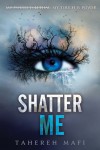midnight coffee monster
I am a fully-motivated and crazy reader of avid proportions. A book is always at the ready no matter where I am, usually a fantasy of some kind or contemporary. (Nie zu viele Bücher!)
Currently reading
Book Review: Every You, Every Me by David Levithan

Two words: teen angst! And how does one evoke more teen angst? Strike through wording!
Evan has lost his best friend, Ariel, but how? Readers are not meant to discover a solid explanation until the end. In the mean time, Evan is haunted by her through memories and his own guilt for actions that resulted in her absence. Then, beginning on Ariel's birthday, someone starts leaving photos for Evan: a picture of trees, a picture of him, more trees, more Evan, and finally... pictures of Ariel. Evan, no thanks to his guilt and truck load of angst!angst!angst, interprets these as messages meant to punish him, and he's right.
So what happened to Ariel and who is stalking Evan? Why is someone stalking Evan? Several ideas popped in and out of my head, none of which were correct, and I am honestly sad that I didn't see it sooner. In retrospect, because Every You, Every Me is easy to zip through, I most likely overlooked tell-tale hints. No matter, because Levithan did not capture my intrigue. The concept of Every You, Every Me is interesting and true: there are several unalike fragments that make up the whole of an individual. We (speaking generally) often choose to reveal only one aspect of ourselves to certain people. This story, however, is a far cry from any kind of thrill.
If you can manage two or three uninterrupted hours, this is not difficult to read and finish in one sitting. Delighted to discover this wouldn't take long to finish--a quick, light book--I originally slapped Every You, Every Me a three-star rating. What it comes down to in the end, however, is quality, which I find sub-par. I dislike the angst and word-striking (among other things), but it isn't terrible, and I know terrible: those books that take days of resentful trudging, and the only reason I find myself continuing to read is the simple yet sad motivation to say, "I did it! I read the book!" Regardless:
Strike-through. I can't stand it. I don't find it clever; I find it annoying, especially when 65% or more of the text has a line running through it. I read
"What'd you do last night?"
I never do anything. "Not much, you?"
and I wonder why the narrator can't simply say that to his or her audience. It's not pleasing, aesthetically, but the bulk of Every You, Every Me's struck-through text could have avoided a strike had Levithan phrased it differently. At other times, it is doesn't look needed whatsoever:
I put the photograph back in the envelope. I didn't put the envelope back on the ground. I kept it.
Because Evan decides to keep the photograph, which he places inside the envelope, it indicates that the envelope is not returned to the ground.

Did I mention there are entire struck-through entries? Well, there are entries entirely struck through.
To add, Evan's angst is vastly explored but little else is. Because this seems more like a neat project Levithan opted to do, I feel doubtful that he intended for it to work in conjunction with the title. The photographs shown were taken by Jonathan Farmer, who'd send Levithan any random photo(s) from which Levithan would construct his plot around. It's similar to how Ransom Riggs wrote Miss Peregrine's Home for Peculiar Children , yet I enjoyed Riggs' book. The plot is layered, as are the characters. In contrast, Every You, Every Me offers one-dimensional characters and a weak plot in which very little occurs.
Suspense that should surround the mysterious photographs--who is leaving them and why?--goes by uneventful until the near-end, to which I say: what the heck is that? The "climax" (it would be the climax if I had felt proper suspension) comes much too quickly, too predictably, and ends similarly. This is an issue I have with the book in general. If Levithan had put in more effort--allowed necessary timing for events to pop up and unfold, realistic teen dialogue, less broody angst, perhaps a twist or two--this story would simply be a better story.
Although I have read Will Grayson, Will Grayson and Nick & Norah's Infinite Playlist , this is, technically, my second Levithan book. The problems I have with this are similar to the ones I have with Boy Meets Boy , yet I already expected the lackluster effect because I'd already read Boy Meets Boy. What I know of David Levithan's writing style is not much, but I understand that he is a popular author. I just haven't discovered why.











